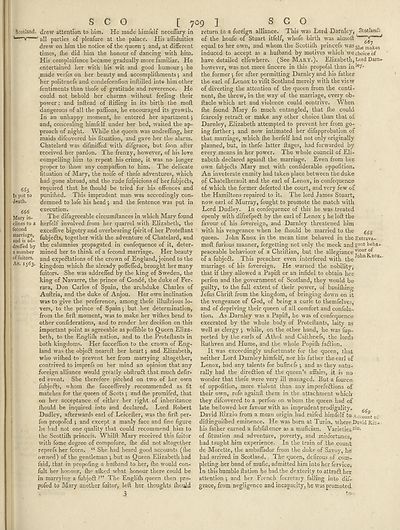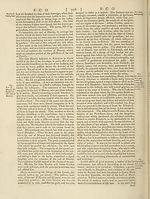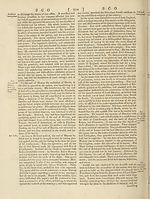Encyclopaedia Britannica, or, a Dictionary of arts, sciences, and miscellaneous literature : enlarged and improved. Illustrated with nearly six hundred engravings > Volume 18, RHI-SCR
(747) Page 709
Download files
Complete book:
Individual page:
Thumbnail gallery: Grid view | List view

SCO
[ 709 ]
SCO
Scotland.
65s
Is put to
death.
666
Mary in¬
clines to a
fecond
marriage,
and is ad-
drefled by
a number
of fuitors.
An. 1563.
drew attention to him. He made himfelf neceffary in
^ all parties of pleafure at the palace. His affiduities
drew on him the notice of the queen } and, at different
times, ftie did him the honour of dancing with him.
His complaifance became gradually more familiar. He
entertained her with his wit and good humour j he
made verfes on her beauty and accomplifhments} and
her politenefs and condefcenfion inftilled into him other
fentiments than thofe of gratitude and reverence. He
could not behold her charms without feeling their
power: and inftead of Hiding in its birth the moft
dangerous of all the paffions, he encouraged its growth.
In an unhappy moment, he entered her apartment;
and, concealing himfelf under her bed, waited the ap¬
proach of night. While the queen was undreffmg, her
maids difcovered his fituation, and gave her the alarm.
Chatelard was difmiffed with difgrace, but foon after
received her pardon. The frenzy, however, of his lore
compelling him to repeat his crime, it was no longer
proper to ihow any compaffion to him. The delicate
fituation of Mary, the noife of thefe adventures, which
had gone abroad, and the rude fufpicions of her fubjefts,
required that he (hould be tried for his offences and
punilhed. This imprudent man was accordingly con¬
demned to lofe his head j and the fentence was put in
execution.
The difagreeable circumftances in which Mary found
herfelf involved from her quarrel with Elizabeth, the
exceflive bigotry and overbearing fpiritof her Proteftant
fubje&s, together with the adventure of Chatelard, and
the calumnies propagated in confequence of it, deter¬
mined her to think of a fecond marriage. Her beauty
and expectations of the crown of England, joined to the
kingdom which fhe already poffeffed, brought her many
fuitors. She was addreffed by the king of Sweden, the
king of Navarre, the prince of Conde, the duke of Fer¬
rara, Don Carlos of Spain, the archduke Charles of
Auftria, and the duke of Anjou. Her own inclination
was to give the preference, among thefe illufirious lo¬
vers, to the prince of Spain; but her determination,
from the firfl: moment, was to make her wifties bend to
other confiderations, and to render her decifion on this
important point as agreeable as poflible to Queen Eliza¬
beth, to the Englifh nation, and to the Proteftants in
both kingdoms. Her fuccefiion to the crown of Eng¬
land was the objeft nearefi: her heart} and Elizabeth,
who wilhed to prevent her from marrying altogether,
contrived to imprefs on her mind an opinion that any
foreign alliance would greatly obfiruCl that much defir-
ed event. She therefore pitched on two of her own
fubieCts, whom fhe fucceflively recommended as fit
matches for the queen of Scots ; and fhe promifed, that
on her acceptance of either her right of inheritance
fhould be inquired into and declared. Lord Robert
Dudley, afterwards earl of Leicefter, was the firff per-
fon propofed j and except a manly face and fine figure
he had not one quality that could recommend him to
the Scottifh princefs. Whilft: Mary received this fuitor
with fome degree of compofure, fhe did not altogether
reprefs her fcorn. “ She had heard good accounts (ihe
owned) of the gentleman •, but as Queen Elizabetli had
faid, that in propofing a hufband to her, fhe would con-
fult her honour, fh^ afked what honour there could be
in marrying a fubjeft ?” The Englifli queen then pro¬
pofed to Mary another fuitor, left her thoughts fhould
v 3
return to a foreign alliance. This was Lord Dafnley, Scotland^
of the houfe of Stuart itfelf, whofe birth was almoft “T) 1 ^
equal to her own, and whom the Scottith princefs was sjie mJkes
induced to accept as a hufband by motives which we choice of
have detailed elfewhere. (See Mary.). Elizabeth, Lord Darn-
however, was not more fincere in this propofal than in1®?*
the former •, for after permitting Darnley and his father
the earl of Lenox to vifit Scotland merely with the view
of diverting the attention of the queen from the conti¬
nent, fhe threw, in the way of the marriage, every ob-
ftacle which art and violence could contrive. When
fhe found Mary fo much entangled, that fhe could
fcarcely retract or make any other choice than that of
Darnley, Elizabeth attempted to prevent her from go¬
ing farther; and now intimated her difapprobation of
that marriage, which fhe herfelf had not only originally
planned, but, in thefe latter ftages, had forwarded by
every means in her power. The tvhole council of Eli¬
zabeth declared againft the marriage. Even from her.
own fubje&s Mary met with confiderable oppofition.
An inveterate enmity had taken place between the duke
of Chatelherault and the earl of Lenox, in confequence
of which the former deferted the court, and very few of
the Hamiltons repaired to it. The lord James Stuart,
now earl of Murray, fought to promote the match with
Lord Dudley. In confequence of this he was treated
openly with difrefpeft by the earl of Lenox $ he loft the
favour of his fovereign, and Darnley threatened him
with his vengeance when he fhould be married to the
queen. John Knox in the meantime behaved in the Extrava-
moft furious manner, forgetting not only the meek and gant beha-
peaceable behaviour of a Chriftian, but the allegiance ^1<?ur1?t
of a fubjefh This preacher even interfered with tlm ° *n n°Xi
marriage of his fovereign. He warned the nobility,
that if they allowed a Papift or an infidel to obtain her
perfon and the government of Scotland, they would be
guilty, to the full extent of their power, of banifhing
Jefus Chrift from the kingdom, of bringing down on it
the vengeance of God, of being a curfe to themfelves*
and of depriving their queen of all comfort and confola-.
tion. As Darnley was a Papift, he was of confequence
execrated by the whole body of Proteftants, laity as
well as clergy j while, on the other hand, he was fup-
ported by the earls of Athol and Caithnefs, the lords
Ruthven and Hume, and the whole Popilh fadlion.
It was exceedingly unfortunate for the queen, that
neither Lord Darnley himfelf, nor his father the earl of
Lenox, had any talents for bufinefs j and as they natu¬
rally had the dire£lion of the queen’s affairs, it is no
wonder that thefe were very ill managed. But a fource
of oppofition, more violent than any imperfections of
their own, rofe againft them in the attachment which
they difcovered to a perfon on whom the queen had of
late bellowed her favour with an imprudent prodigality.
David Rizzio from a mean origin had raifed bimfelf to-Account 0
diftinguifiied eminence. He was born at Turin, where David Ri-*
his father earned a fubfiftence as a mufician. Varieties2*0,
of fituation and adventure, poverty, and misfortunes,
had taught him experience. In the train of the count
de Morette, the ambaffador from the duke of Savoy, he
had arrived in Scotland. . The queen, delirous of com¬
pleting her band of mufic, admitted him into her fervice.
In this humble ftation he had the dexterity to attraft her
attention *, and her French fecretary falling into dif¬
grace, from negligence and incapacity, he was promoted
to-■
[ 709 ]
SCO
Scotland.
65s
Is put to
death.
666
Mary in¬
clines to a
fecond
marriage,
and is ad-
drefled by
a number
of fuitors.
An. 1563.
drew attention to him. He made himfelf neceffary in
^ all parties of pleafure at the palace. His affiduities
drew on him the notice of the queen } and, at different
times, ftie did him the honour of dancing with him.
His complaifance became gradually more familiar. He
entertained her with his wit and good humour j he
made verfes on her beauty and accomplifhments} and
her politenefs and condefcenfion inftilled into him other
fentiments than thofe of gratitude and reverence. He
could not behold her charms without feeling their
power: and inftead of Hiding in its birth the moft
dangerous of all the paffions, he encouraged its growth.
In an unhappy moment, he entered her apartment;
and, concealing himfelf under her bed, waited the ap¬
proach of night. While the queen was undreffmg, her
maids difcovered his fituation, and gave her the alarm.
Chatelard was difmiffed with difgrace, but foon after
received her pardon. The frenzy, however, of his lore
compelling him to repeat his crime, it was no longer
proper to ihow any compaffion to him. The delicate
fituation of Mary, the noife of thefe adventures, which
had gone abroad, and the rude fufpicions of her fubjefts,
required that he (hould be tried for his offences and
punilhed. This imprudent man was accordingly con¬
demned to lofe his head j and the fentence was put in
execution.
The difagreeable circumftances in which Mary found
herfelf involved from her quarrel with Elizabeth, the
exceflive bigotry and overbearing fpiritof her Proteftant
fubje&s, together with the adventure of Chatelard, and
the calumnies propagated in confequence of it, deter¬
mined her to think of a fecond marriage. Her beauty
and expectations of the crown of England, joined to the
kingdom which fhe already poffeffed, brought her many
fuitors. She was addreffed by the king of Sweden, the
king of Navarre, the prince of Conde, the duke of Fer¬
rara, Don Carlos of Spain, the archduke Charles of
Auftria, and the duke of Anjou. Her own inclination
was to give the preference, among thefe illufirious lo¬
vers, to the prince of Spain; but her determination,
from the firfl: moment, was to make her wifties bend to
other confiderations, and to render her decifion on this
important point as agreeable as poflible to Queen Eliza¬
beth, to the Englifh nation, and to the Proteftants in
both kingdoms. Her fuccefiion to the crown of Eng¬
land was the objeft nearefi: her heart} and Elizabeth,
who wilhed to prevent her from marrying altogether,
contrived to imprefs on her mind an opinion that any
foreign alliance would greatly obfiruCl that much defir-
ed event. She therefore pitched on two of her own
fubieCts, whom fhe fucceflively recommended as fit
matches for the queen of Scots ; and fhe promifed, that
on her acceptance of either her right of inheritance
fhould be inquired into and declared. Lord Robert
Dudley, afterwards earl of Leicefter, was the firff per-
fon propofed j and except a manly face and fine figure
he had not one quality that could recommend him to
the Scottifh princefs. Whilft: Mary received this fuitor
with fome degree of compofure, fhe did not altogether
reprefs her fcorn. “ She had heard good accounts (ihe
owned) of the gentleman •, but as Queen Elizabetli had
faid, that in propofing a hufband to her, fhe would con-
fult her honour, fh^ afked what honour there could be
in marrying a fubjeft ?” The Englifli queen then pro¬
pofed to Mary another fuitor, left her thoughts fhould
v 3
return to a foreign alliance. This was Lord Dafnley, Scotland^
of the houfe of Stuart itfelf, whofe birth was almoft “T) 1 ^
equal to her own, and whom the Scottith princefs was sjie mJkes
induced to accept as a hufband by motives which we choice of
have detailed elfewhere. (See Mary.). Elizabeth, Lord Darn-
however, was not more fincere in this propofal than in1®?*
the former •, for after permitting Darnley and his father
the earl of Lenox to vifit Scotland merely with the view
of diverting the attention of the queen from the conti¬
nent, fhe threw, in the way of the marriage, every ob-
ftacle which art and violence could contrive. When
fhe found Mary fo much entangled, that fhe could
fcarcely retract or make any other choice than that of
Darnley, Elizabeth attempted to prevent her from go¬
ing farther; and now intimated her difapprobation of
that marriage, which fhe herfelf had not only originally
planned, but, in thefe latter ftages, had forwarded by
every means in her power. The tvhole council of Eli¬
zabeth declared againft the marriage. Even from her.
own fubje&s Mary met with confiderable oppofition.
An inveterate enmity had taken place between the duke
of Chatelherault and the earl of Lenox, in confequence
of which the former deferted the court, and very few of
the Hamiltons repaired to it. The lord James Stuart,
now earl of Murray, fought to promote the match with
Lord Dudley. In confequence of this he was treated
openly with difrefpeft by the earl of Lenox $ he loft the
favour of his fovereign, and Darnley threatened him
with his vengeance when he fhould be married to the
queen. John Knox in the meantime behaved in the Extrava-
moft furious manner, forgetting not only the meek and gant beha-
peaceable behaviour of a Chriftian, but the allegiance ^1<?ur1?t
of a fubjefh This preacher even interfered with tlm ° *n n°Xi
marriage of his fovereign. He warned the nobility,
that if they allowed a Papift or an infidel to obtain her
perfon and the government of Scotland, they would be
guilty, to the full extent of their power, of banifhing
Jefus Chrift from the kingdom, of bringing down on it
the vengeance of God, of being a curfe to themfelves*
and of depriving their queen of all comfort and confola-.
tion. As Darnley was a Papift, he was of confequence
execrated by the whole body of Proteftants, laity as
well as clergy j while, on the other hand, he was fup-
ported by the earls of Athol and Caithnefs, the lords
Ruthven and Hume, and the whole Popilh fadlion.
It was exceedingly unfortunate for the queen, that
neither Lord Darnley himfelf, nor his father the earl of
Lenox, had any talents for bufinefs j and as they natu¬
rally had the dire£lion of the queen’s affairs, it is no
wonder that thefe were very ill managed. But a fource
of oppofition, more violent than any imperfections of
their own, rofe againft them in the attachment which
they difcovered to a perfon on whom the queen had of
late bellowed her favour with an imprudent prodigality.
David Rizzio from a mean origin had raifed bimfelf to-Account 0
diftinguifiied eminence. He was born at Turin, where David Ri-*
his father earned a fubfiftence as a mufician. Varieties2*0,
of fituation and adventure, poverty, and misfortunes,
had taught him experience. In the train of the count
de Morette, the ambaffador from the duke of Savoy, he
had arrived in Scotland. . The queen, delirous of com¬
pleting her band of mufic, admitted him into her fervice.
In this humble ftation he had the dexterity to attraft her
attention *, and her French fecretary falling into dif¬
grace, from negligence and incapacity, he was promoted
to-■
Set display mode to:
![]() Universal Viewer |
Universal Viewer | ![]() Mirador |
Large image | Transcription
Mirador |
Large image | Transcription
Images and transcriptions on this page, including medium image downloads, may be used under the Creative Commons Attribution 4.0 International Licence unless otherwise stated. ![]()
| Permanent URL | https://digital.nls.uk/193028418 |
|---|
| Attribution and copyright: |
|
|---|
| Description | Ten editions of 'Encyclopaedia Britannica', issued from 1768-1903, in 231 volumes. Originally issued in 100 weekly parts (3 volumes) between 1768 and 1771 by publishers: Colin Macfarquhar and Andrew Bell (Edinburgh); editor: William Smellie: engraver: Andrew Bell. Expanded editions in the 19th century featured more volumes and contributions from leading experts in their fields. Managed and published in Edinburgh up to the 9th edition (25 volumes, from 1875-1889); the 10th edition (1902-1903) re-issued the 9th edition, with 11 supplementary volumes. |
|---|---|
| Additional NLS resources: |
|

